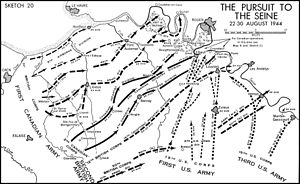| 6th Airborne Division advance to the River Seine | |||||||||
|---|---|---|---|---|---|---|---|---|---|
| Part of the Battle of Normandy | |||||||||
 Map of the First Canadian Army's advance, August 1944. | |||||||||
| |||||||||
| Belligerents | |||||||||
|
|
| ||||||||
| Commanders and leaders | |||||||||
|
|
| ||||||||
| Units involved | |||||||||
| 6th Airborne Division | 711th Infantry Division | ||||||||
| Casualties and losses | |||||||||
| 4,457 | Unknown | ||||||||
| British casualties are from the start of the campaign, 6 June 1944 | |||||||||
The 6th Airborne Division advance to the River Seine occurred in August 1944, in the later stages of the Battle of Normandy, following the German Army's defeat in the Falaise Pocket, during the Second World War.
The British 6th Airborne Division, under the command of Major-General Richard Nelson Gale, was one of the first Allied units to arrive in Normandy on D-Day, 6 June 1944, and successfully secured the left flank of the invasion zone. Resisting efforts to dislodge them by the combined efforts of two infantry and one panzer division, a month later they were ordered to prepare to advance.[1] Their objective was the mouth of the River Seine, 45 miles (72 km) away. To assist them in carrying out their mission, the division was reinforced by the 1st and 4th Special Service Brigades, the 1st Belgian Infantry Brigade and the Royal Netherlands Motorized Infantry Brigade, as well as increased artillery support. To reach the Seine, the division had to cross three rivers that had been flooded by the Germans, and had only two roads available to them.
The 6th Airborne Division began their advance on 17 August, after the German Army had started to withdraw. Fighting several small battles, by the end of the month they reached their objective at the River Seine. Here the division halted until early in September, when they returned to England to prepare for further airborne operations later in the war.
- ^ Saunders, p.180